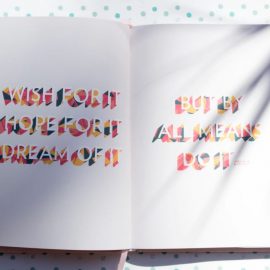

This article gives you a glimpse of what you can learn with Shortform. Shortform has the world’s best guides to 1000+ nonfiction books, plus other resources to help you accelerate your learning.
Want to learn faster and get smarter? Sign up for a free trial here .
Are your reading skills lacking? How can you be a better reader?
Reading is an important skill that people of all ages need. Don’t worry if your literary skills aren’t up to par—we have plenty of tips that’ll help you get the most out of your reading time.
Learn how to be a better reader and why picking up a book every once in a while is worth your time.
The Benefits of Being a Better Reader
Before diving into how to be a better reader, let’s take a look at four benefits of improving your literacy. According to 10 Days of Faster Reading by Abby Marks Beale and the Princeton Language Institute, reading will:
- Improve your focus, comprehension, and memory of what you read. When you employ the skills associated with speed-reading, you concentrate more closely on what you’re reading. This leads to better comprehension—if you’re paying close attention to the text, you’re more likely to understand the information within it. Finally, a higher level of focus and comprehension helps you to form stronger memories of what you read.
- Increase the volume of material you read. As you learn speed-reading skills, you get through reading material more quickly and can therefore read a larger quantity of texts. After practicing your skills, you may be able to get through certain texts by just skimming them, increasing your speed even further.
- Reading with joy and confidence. Speed-reading strategies increase your enjoyment of reading due to increased confidence in your abilities as you master the techniques. Increased confidence makes reading an activity to enjoy freely rather than something to avoid because you feel insecure about it.
- Broaden your professional expertise. Reading more efficiently and effectively can contribute to greater professional success. Reading is necessary for keeping up with the latest news and developments in any professional field. However, there’s often so much material to get through that it feels too overwhelming, especially on top of your regular work. By reading more, faster, and with greater competence, you can stay on top of developments in your field and become more knowledgeable in your role.
Tips for Proficient Reading
Finishing a book might be a hard task to accomplish if it’s not any fun. However, reading doesn’t have to be a chore that you feel obligated to get through, just as long as you know how to read effectively.
Let’s look at a few tips for learning how to be a better reader.
Be Selective About What You Read
10 Days of Faster Reading notes that you can learn how to be a better reader by being selective about what you read. Before you begin reading any text, the authors suggest identifying why you want to read it and how you might use the information in the text later on.
Your “why” for reading something will vary from text to text. For example, you might read a book about procrastination to learn strategies for making better use of your time. This information could help you further your professional goals and feel less stressed about getting everything done. Or, you might read a fantasy novel purely for enjoyment—the story expands your imagination and helps you relax.
Assessing a text before you begin ensures that you don’t waste any time reading material that isn’t useful to you. Additionally, this process helps with focus and efficiency—when you start with a clear “why,” it’s easier to keep your attention on the text in pursuit of your goal. When you’re paying closer attention, you don’t reread or daydream as much, so you get through the text faster and comprehend it better.
Draw Connections to Other Books
Readers who are new to literature might feel as though everything they read is new. But really, there is no such thing as a new story, says Thomas C. Foster in How to Read Literature Like a Professor. All literary works are alive and involved with each other like eels in a barrel. Each time a new eel is created, it squirms its way into the barrel. It is new, but it’s also an eel just like every other one that ever has been or ever will be in the barrel.
Just because an author can’t create anything purely original anymore, doesn’t mean that modern literature is derivative or unimportant. Rather, new literature gains significance from the harmony and dissonance it strikes with what came before.
Once you understand that all stories—no matter the genre—exist together as part of one big story, you can begin to see the patterns and recurrences between them. This is what critics call intertextuality. Authors use references and parallels to draw connections to previous literary works. Intertextuality in literature deepens the meaning of the text by drawing on the reader’s expectations.
Skim the Book Beforehand
According to How to Read a Book by Mortimer J. Adler and Charles Van Doren, skimming a book helps to understand its main points and its structure. It aims to gain the best understanding of the book in a limited time (the authors advise setting a target for 15 minutes to comprehend a 300-page book).
Adler and Van Doren argue that when most people read a book, they do so cover to cover. When you read a book in that way, you’re trying to understand what a book is about at the same time you are trying to understand what the author is saying. To contrast, if you start by skimming the entire book to get a sense of what it’s about before reading from the beginning, you’ll already be in the right headspace to process the information.
After reading inspectionally, the authors believe you should be able to answer these three questions:
- What genre does the book fit into?
- What is the overall message of the book?
- How does the author develop her arguments?
Techniques for Inspectional Reading
- Read the title.
- How helpful this is depends on the book. Some titles tell the reader exactly what to expect from the book, like Ibram X. Kendi’s How to Be an Antiracist or Henry Hazlitt’s Economics in One Lesson. However, many modern titles are less explicit, like Malcolm Gladwell’s Blink.
- Read the preface and the blurb.
- The author often explains what the book is about, and how to tackle it.
- Read the table of contents.
- Scan the index for a range of topics covered. More important topics will have more pages.
- Find the main chapters of the book, and read the summary areas of those chapters.
- The summary areas are often at the end of the chapter, or at the end of each major section.
- Flip through the book to get a general sense of the book’s pacing and how the author’s argument will unfold.
Find Keywords and Important Sentences
Analytical reading aims to, without imposing any time restraints, gain the best understanding of the book possible. Not only should you aim to understand what is being said, but you should also develop a personal opinion about its validity.
How to Read a Book states that to learn how to be a better reader, you must understand the author’s goals in writing the book. This requires finding out what problems the author is trying to solve and what questions the book tries to answer.
How to Find Keywords
You need to comprehend what the book is actually saying, and what arguments the author makes about her questions. To find what the book says, Adler and Van Doren advise looking for keywords. Keywords are meaningful words or phrases that are used often and convey a wealth of information. As a reader, you need to understand the keywords of the author and what is meant by them. This is especially important because the same word can mean different things to different authors.
How do you find keywords? Adler and Van Doren provide two clues to identifying the most important terms in a book. First, a word is probably important if the author deliberately uses it differently than other writers do (particularly if the author makes a point to explain why those other writers’ definitions are incorrect or incomplete). Second, if you struggle to understand how an author is using a particular word, that’s a sign that the word is important: Authors frequently use keywords in unique ways to express their most important (and, often, most complex) ideas.
How to Find Key Sentences
After identifying keywords, Adler and Van Doren recommend finding the author’s leading propositions in her most important sentences. Important sentences express parts of the author’s argument. Here are some tips on how to find them:
- Special sentences may be formatted stylistically or set apart (for example, with italics or underlining).
- The important words are often contained in the important sentences. Therefore, if you spot a keyword, pay special attention to the sentence it’s located in.
- Pay attention to words that confuse you, rather than words that grab your interest.
Practice Speed Reading
Follow these steps to increase your reading speed in just a few minutes, as advised in The 4-Hour Workweek by Tim Ferris:
- For two minutes, read while running your finger or a pencil under each line as you read it as fast as you can. This will help your eye jump to the next line without losing any time reorienting.
- For three minutes, focus on the third word at the beginning and end of each line. This way you can move your eyes less. You can catch the beginning and end of each line with your peripheral vision. Indent further as you get more comfortable.
- For three minutes, read as fast as you can using the above techniques for five pages. It doesn’t matter if you remember anything you read. Then, go back to a comfortable speed. You’ve reset your baseline by speeding through those five pages, so your “comfortable speed” will be twice as fast as your regular speed.
If you want to figure out how fast you read a particular book, calculate the average number of words per line using ten lines. To get the average words per page, multiply the average words per line by the number of lines per page. Time how many pages you can read in a minute, and then multiply the page count by the average number of words per page.
Wrapping Up
You don’t have to be a perfect reader who can take in information at the speed of light, but good comprehension skills do come in handy. Whether you want to improve your reading for educational, professional, or personal endeavors, learning how to be a better reader is a great brain exercise.
What are other ways to learn how to be a better reader? Let us know in the comments below!

Want to fast-track your learning? With Shortform, you’ll gain insights you won't find anywhere else .
Here's what you’ll get when you sign up for Shortform :
- Complicated ideas explained in simple and concise ways
- Smart analysis that connects what you’re reading to other key concepts
- Writing with zero fluff because we know how important your time is






